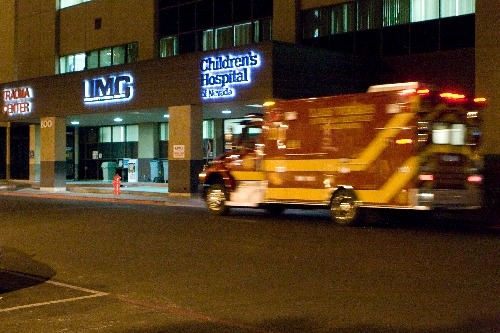Union, commissioners’ concerns delay vote regarding new UMC board

County commissioners Wednesday delayed voting on a measure to give operational oversight of University Medical Center to a separate board, choosing to approach the issue again Dec. 5.
The delay gives officials time to address problems several commissioners have with the proposal, including concerns about who would be on the board and what hospital records would be made public.
Had the issue faced a vote Wednesday , it probably would have failed before the seven-member board. It will face stiff resistance from some commissioners and employee unions, no matter what changes are made.
"Be careful what we ask for," Commissioner Chris Giunchigliani said. "This could be the death knell for UMC, and it could be death by a thousand cuts."
Advocates for the change, which include the hospital’s CEO, Brian Brannman, argue that removing operational oversight of the public hospital from commissioners and giving it to a full-time board that can meet in private would allow UMC to better compete with private hospitals in the valley. UMC is the only public hospital in Southern Nevada.
The change would not be unusual. Public hospitals nationwide, strapped for cash and equipped with an antiquated business model, have modeled themselves after their private-industry competitors.
UMC would remain a public hospital, with its commitment to serve the poor and uninsured, and commissioners would have the authority to end the arrangement. But commissioners need the Legislature’s approval before changing the hospital’s governance, and the board is split about the need for the change.
"We’ve got nine people (executives) administering this hospital," Commissioner Tom Collins said. "Why do we need to make another board that does these things?"
Commissioners must get a bill draft to the Legislature before Dec. 15. The Legislature meets in February.
Commissioners asked staff to revise Wednesday’s draft to reflect some of their concerns. Several commissioners wondered who would serve on the hospital board, whether those people would be paid and how they could prevent conflicts of interest. They cited the current UMC Hospital Advisory Board, an oversight group, as an example where some members have business interests – or want them – with the hospital.
The proposal includes provisions requiring members to disclose conflicts, but Commissioner Steve Sisolak questioned whether they went far enough.
The plan would come with a dramatic restriction of public information about the hospital. Contracts, employee names and nearly all hospital board meetings would be private. Several commissioners said they wouldn’t allow such a move away from transparency.
"I think the finances and the contracts have to be public," Sisolak said.
Also causing contention is what will happen to the hospital’s several thousand employees. Brannman said they would be public employees, with the same benefits, but work for the new hospital management. He said he wouldn’t want to make any changes to their contracts or benefits without consulting them first.
But that did not soothe the dozens of union and hospital employees at Wednesday’s meeting. Al Martinez, president of the Service Employees International Union Local 1107 told commissioners he wouldn’t support any changes to UMC’s governance.
"I’m going to fight you," he said. "If we move forward, I ain’t backing down."
The road to changing who oversees the hospital and approves its contracts would be a long one. If commissioners next month approve going ahead with the idea, it would have to pass in the Legislature, which could also change the bill.
Commissioners, if they still wanted the change, then would have to choose a panel to select the members of the hospital board.
Under the current plan, board members would draft bylaws for the board, and commissioners would have to approve them. The process could take years.
Brannman said the hospital must walk a tightrope between its mission as a public hospital and the need for the hospital to be viable in the future. The hospital provides $250 million in uncompensated care each year and makes enough money to cover all but between $60 million and $70 million. The county pays for that amount, but most people don’t believe the model is sustainable.
Giunchigliani said the discussion over governance was a diversion from the real issue: how to find additional funding for the hospital.
"We’re focusing on governance and not on funding. You will always subsidize a county hospital. It comes down to how will you lessen the bleeding."
She said the county should seek other sources of funding, such as creating a tax district to help pay for the hospital.
Contact reporter Lawrence Mower at lmower@reviewjournal.com or 702-405-9781.